

|
|
Two Mothers AKA Zwei Mütter
R1 - America - Canteen Outlaws / TLA Releasing Review written by and copyright: Eric Cotenas (22nd January 2015). |
|
The Film
 Best Actress: Sabine Wolf (win) - Iris Prize Best Dialogue: Anne Zohra Berrached (win) - Berlin International Film Festival Special Mention: Karina Plachetka and Sabine Wolf (win) - Potsdam Sehsüchte Best Fiction (nominated) - Potsdam Sehsüchte Best Feature Film (nominated) - São Paulo International Film Festival Best Film (nominated) - Tallinn Black Nights Film Festival When part-time florist Isabella (Karina Plachetka) and video store assistant manager Katja (Sabine Wolf) decide that the time is right to have a baby, they appear to have been thoroughly blind to the challenges a gay couple face when trying to adopt or conceive a child. The more studious Isabella makes the calls to multiple clinics and is told variously that it is against German social welfare law statutes to give sperm donations to homosexual couples or that there is no unified law across the territories; and even then, she finds many doctors unwilling to treat lesbian couples. The more laid-back Katja secures an appointment, but it is contingent upon the approval of their finances by a lawyer who explains to them that they favor well-off clients because the doctor withholds the identity of the father until the child's eighteenth birthday and could be financially liable if their financial situations change. They seem to have better luck with a kindly older doctor who agrees to help them, but eleven unsuccessful inseminations over nine months take an emotional and financial toll on the couple. Isabella, who has "never felt poor", has quit her job – as she had planned to when the baby was born – and dedicated herself fulltime to practices meant to ensure a successful insemination. The financial burden weighs even more heavily upon Katja as her paycheck at a monotonous job goes directly to insemination treatments, maternity books, videos, and stacks of pregnancy tests. After an argument about finances, they decide to seek out sperm donors and perform the inseminations at home, Isabella and Katja enter the internet world of sketchy homemade products and dodgy internet profiles (the latter a potential for laughs in a comedy but painfully uncomfortable here as the transaction seems to have fetishistic qualities for some of the donors). When they have to define criteria with which to select donors to meet, the father is no longer an anonymous donor providing a service; and Katja goes from feeling like a means to an end (financially) to an even more of a third wheel since she feels that Isabella may very well end up in bed with a man to realize her desire to have a child. Writer/director Anne Zohra Berrached bases her script upon the true experiences of a number of German couples and gives a more nuanced pair of characterizations (as realized by Plachetka and Wolf) than one might find in a more conventional "issue" film. The film also avoids the temptation to portray the couple as being virtuous people victimized by cultural and social attitudes in favor of a look at the stresses put on their relationship. Isabella seems oblivious to Katja's frustrations and concerns, and even self-centered in her quest that becomes more about having a child than having a family, but it is obvious that she feels each failure as her own given how much more difficult it is to get pregnant at her age. While Katja might not seem as insensitive as Isabella accuses her, her own persistence and endurance is questionable until her own maternal yearnings and capacity for nurturing are revealed late in the film. Doubts and resentments linger after the climax, making one wonder if the presence of a baby will be enough to keep the couple together. While not exactly uplifting, Two Mothers may be relatable to gay/lesbian and straight couples alike as they question if they really are ready, financially and emotionally, to have a child (by whatever means) and to question their expectations of what a child will bring to the relationship. 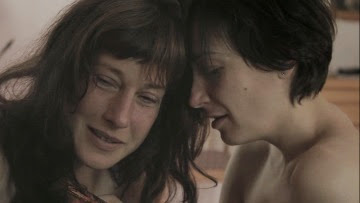 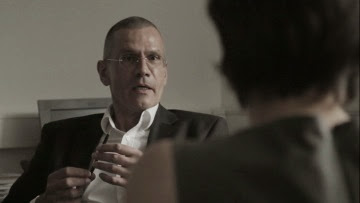 
Video
Canteen Outlaws' single-layer, progressive, anamorphic 1.78:1 widescreen transfer is effected by a bizarre encoding glitch in which the image jumps ahead several frames for an almost subliminal single frame flash-forward and then back in more than ten spots. This does not appear to be a deliberate stylistic choice, as one of the single frame flashes includes the burnt-in subtitle from the dialogue in the subsequent shot in its proper place (suggesting, thankfully, that is not the fault of the original digital editing export). Although it does not ruin the viewing experience, it is annoying once noticed. 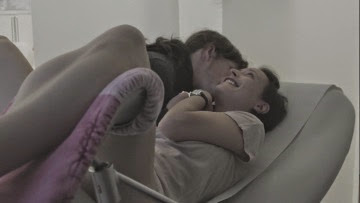  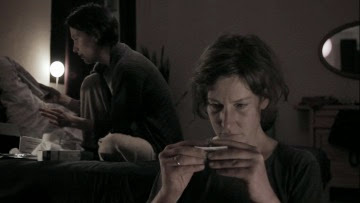
Audio
The single Dolby Digital 2.0 stereo German audio track seems appropriate for this dialogue-heavy film. There are no songs and the scoring is very sparse, as is the sound design which seems to offer next to nothing that one would expect in the rear channels of a surround mix. The burnt-in English subtitles may be British in origin since they refer to what we stateside call ladybugs as a "ladybird". It also contains the typo "common" where a character says "come on".  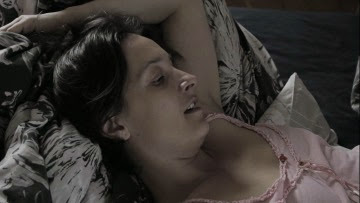 
Extras
There are no extras apart from the film's theatrical trailer (2:16) and trailers for the comedy Big Gay Love and The Mermaids (the release of which I presume will be filled out with other content since it's a thirty-six minute short film).
Packaging
A somewhat provocative cover that is actually a recreation of a moment that is more intimate than erotic in the film itself.
Overall
|
|||||

|